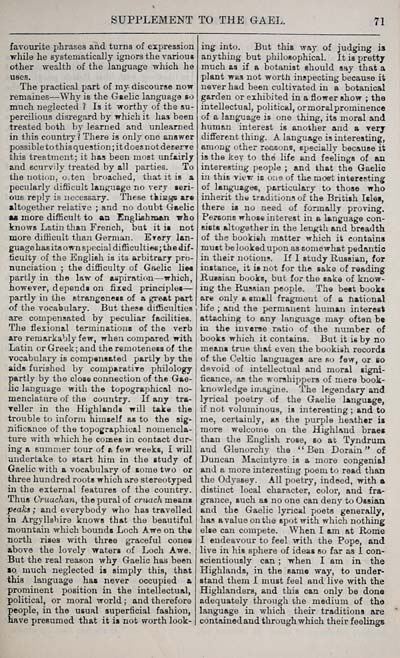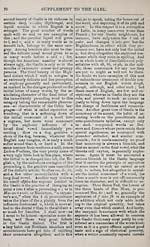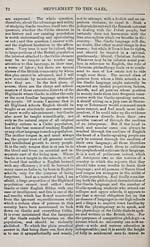Hew Morrison Collection > Gaidheal > 1 Leabh 2 Air
(65)
Download files
Complete book:
Individual page:
Thumbnail gallery: Grid view | List view

SUPPLEMENT TO THE GAEL.
71
favourite phrases and turns of expression
wliile he systematically ignors the various
other wealth of the language which he
uses.
The practical part of my discourse now
remaines — Why is the Gaelic language eo
much neglected ? Is it worthy of the su-
percilious disregard by which it has been
treated both by learned and unlearned
in this countiy ? There is only one answer
possible to this question; it does not decerre
this treatment; it has been most unfairly
and scurvily treated by all parties. To
the notion, o.ten broached, that it is a
pecularly difficult language no very leri-
OU6 reply is necessary. These tkiags are
altogether relative ; and no doubt Gaelic
M more difficult to «q Englinhmftn who
knows Latin than French, but it is not
more difficult than German. Erery lan-
guage has its own special difficulties ; the dif-
ficulty of the English ia its arbitrary pro-
nunciation ; the difficulty of Gaelic lie*
partly in the law of aspiration — which,
however, depends on fixed principle* —
partly in the strangeness of a great part
of the vocabulary. But these difficulties
are comjjensated by peculiar facilities.
The fleiional terminations of the verb
are remarkably few, when compared with
Latin or Greek; and the remoteness of the
vocabulary is compensated partly by the
aids furishod by comparative philology
partly by the close connection of the Gae-
lic language with the topographical no-
menclature of the country. If any tra-
veller in the Highlands will take the
trouble to inform himself as to the sig-
nificance of the topographical nomencla-
ture with which he coaaes in contact dur-
ing a summer tour of a few weeks, I will
undertake to start him in the study of
Gaelic with a vocabulary of some two or
three hundred roots which are stereotyped
in the external features of the country.
Thus Cruachan, the pural of cntach means
peaks ; and everybody who has travelled
in Argyllshire knows that the beautiful
mountain which bounds Loch Awe on the
north rises with three graceful cones
above the lovely waters of Loch Awe.
But the real reason why Gaelic has been
so much neglected is simply this, that
this language has never occupied a
prominent position in the intellectual,
political, or moral world ; and therefore
people, in the usual superficial fashion,
have presumed that it is not worth look-
ing into. But this way of judging is
anything but philosophical. It is pretty
much as if a botanist should say that a
plant was not worth inspecting because it
never had been cultivated in a botanical
garden or exhibited in a flower show ; the
intellectual, political, or moral prominence
of a language is one thing, its moral and
human interest is another and a very
different thing. A language is interesting,
among other reasons, specially because it
is the key to the life and feelings of an
interesting people ; and that the Gaelic
in this view is oae of the moet interesting
of languages, particulary to those who
inherit the traditions of the British Isles,
there is no need of formally proving.
Persons whose interest in a language con-
sists altogether in the length and breadth
of the bookish matter which it contains
must be looked upon as somewhat pedantic
in their notions. If I study Russian, for
instance, it is not for the sake of reading
Russian books, but for the sake of know-
ing the Russian people. The best books
are only a small fragment of a national
life ; and the permanent human interest
attaching to emy language may often be
in the inverae ratio of the number of
books which it contains. But it is by no
means true that even the bookish record*
of the Celtic languages are so few, or so
devoid of intellectual and moral signi-
ficance, as the worshippers of mere book-
knowledge itriagine. The legendary and
lyrical poetry of the Gaelie language,
if not voluminous, is interesting ; and to
me, certainly, as the purple heather is
more welcome on the Highland brae*
than the English rose, eo at Tyndrum
and Glenorchy the ' ' Ben Dorain " of
Duncan Macintyre is a more congenial
and a more interesting poem to read than
the Odyssey. All poetry, indeed, with a
distinct local character, color, and fra-
grance, such as no one can deny to Ossian
and the Gaelic lyrical poets generally,
has a value on the spot with which nothing
else can compete. When I am at Rome
I endeavour to feel with the Pope, and
live in his sphere of ideas so far as I con-
scientiously can ; when I am in the
Highlands, in the same way, to under-
stand them I must feel and live with the
Highlanders, and this can only be dona
adequately through the medium of the
language in which their traditions are
contained and through which their feelings
71
favourite phrases and turns of expression
wliile he systematically ignors the various
other wealth of the language which he
uses.
The practical part of my discourse now
remaines — Why is the Gaelic language eo
much neglected ? Is it worthy of the su-
percilious disregard by which it has been
treated both by learned and unlearned
in this countiy ? There is only one answer
possible to this question; it does not decerre
this treatment; it has been most unfairly
and scurvily treated by all parties. To
the notion, o.ten broached, that it is a
pecularly difficult language no very leri-
OU6 reply is necessary. These tkiags are
altogether relative ; and no doubt Gaelic
M more difficult to «q Englinhmftn who
knows Latin than French, but it is not
more difficult than German. Erery lan-
guage has its own special difficulties ; the dif-
ficulty of the English ia its arbitrary pro-
nunciation ; the difficulty of Gaelic lie*
partly in the law of aspiration — which,
however, depends on fixed principle* —
partly in the strangeness of a great part
of the vocabulary. But these difficulties
are comjjensated by peculiar facilities.
The fleiional terminations of the verb
are remarkably few, when compared with
Latin or Greek; and the remoteness of the
vocabulary is compensated partly by the
aids furishod by comparative philology
partly by the close connection of the Gae-
lic language with the topographical no-
menclature of the country. If any tra-
veller in the Highlands will take the
trouble to inform himself as to the sig-
nificance of the topographical nomencla-
ture with which he coaaes in contact dur-
ing a summer tour of a few weeks, I will
undertake to start him in the study of
Gaelic with a vocabulary of some two or
three hundred roots which are stereotyped
in the external features of the country.
Thus Cruachan, the pural of cntach means
peaks ; and everybody who has travelled
in Argyllshire knows that the beautiful
mountain which bounds Loch Awe on the
north rises with three graceful cones
above the lovely waters of Loch Awe.
But the real reason why Gaelic has been
so much neglected is simply this, that
this language has never occupied a
prominent position in the intellectual,
political, or moral world ; and therefore
people, in the usual superficial fashion,
have presumed that it is not worth look-
ing into. But this way of judging is
anything but philosophical. It is pretty
much as if a botanist should say that a
plant was not worth inspecting because it
never had been cultivated in a botanical
garden or exhibited in a flower show ; the
intellectual, political, or moral prominence
of a language is one thing, its moral and
human interest is another and a very
different thing. A language is interesting,
among other reasons, specially because it
is the key to the life and feelings of an
interesting people ; and that the Gaelic
in this view is oae of the moet interesting
of languages, particulary to those who
inherit the traditions of the British Isles,
there is no need of formally proving.
Persons whose interest in a language con-
sists altogether in the length and breadth
of the bookish matter which it contains
must be looked upon as somewhat pedantic
in their notions. If I study Russian, for
instance, it is not for the sake of reading
Russian books, but for the sake of know-
ing the Russian people. The best books
are only a small fragment of a national
life ; and the permanent human interest
attaching to emy language may often be
in the inverae ratio of the number of
books which it contains. But it is by no
means true that even the bookish record*
of the Celtic languages are so few, or so
devoid of intellectual and moral signi-
ficance, as the worshippers of mere book-
knowledge itriagine. The legendary and
lyrical poetry of the Gaelie language,
if not voluminous, is interesting ; and to
me, certainly, as the purple heather is
more welcome on the Highland brae*
than the English rose, eo at Tyndrum
and Glenorchy the ' ' Ben Dorain " of
Duncan Macintyre is a more congenial
and a more interesting poem to read than
the Odyssey. All poetry, indeed, with a
distinct local character, color, and fra-
grance, such as no one can deny to Ossian
and the Gaelic lyrical poets generally,
has a value on the spot with which nothing
else can compete. When I am at Rome
I endeavour to feel with the Pope, and
live in his sphere of ideas so far as I con-
scientiously can ; when I am in the
Highlands, in the same way, to under-
stand them I must feel and live with the
Highlanders, and this can only be dona
adequately through the medium of the
language in which their traditions are
contained and through which their feelings
Set display mode to: Large image | Transcription
Images and transcriptions on this page, including medium image downloads, may be used under the Creative Commons Attribution 4.0 International Licence unless otherwise stated. ![]()
| Early Gaelic Book Collections > Hew Morrison Collection > Gaidheal > 1 Leabh 2 Air > (65) |
|---|
| Permanent URL | https://digital.nls.uk/76795890 |
|---|
| Attribution and copyright: |
|
|---|---|
| Description | A selection of items from a collection of 320 volumes and 30 pamphlets of literary and religious works in Scottish Gaelic. From the personal library of Hew Morrison, the first City Librarian of Edinburgh. |
|---|
| Description | Selected items from five 'Special and Named Printed Collections'. Includes books in Gaelic and other Celtic languages, works about the Gaels, their languages, literature, culture and history. |
|---|

